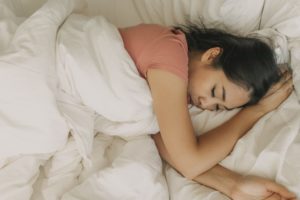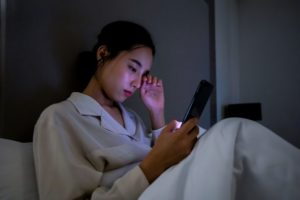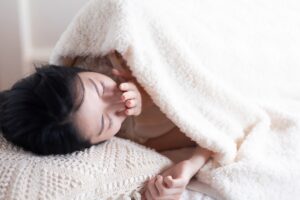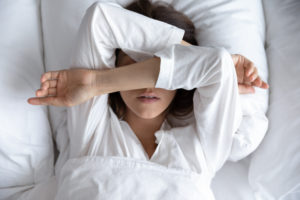When you buy through our links, we may earn a commission. Products or services may be offered by an affiliated entity. Learn more.
Is 7 Hours of Sleep Enough?
- Experts recommend adults get at least 7 hours of sleep per night for better health.
- Getting less than 7 hours of sleep can negatively affect your physical and mental health.
- Many people are not aware when their sleep is temporarily disrupted in the night.
- A consistent schedule and improved nightly routine can help you get the recommended hours of sleep.
While almost everyone has heard about the importance of sleep, it can be difficult to know exactly how much sleep is necessary. For the majority of people, seven hours is just enough.
However, for some people, seven hours is not sufficient. Teenagers, children, and babies need more sleep, and some adults also need more than seven hours.
We discuss the recommended hours of sleep by age, the importance of sleep quality in addition to sleep quantity, the effects and causes of insufficient sleep, and practical tips to enhance nightly rest.
Looking to improve your sleep? Try upgrading your mattress.
Recommended Hours of Sleep by Age
People’s sleep needs change as they age. Babies typically need 12 or more hours of sleep a day, including naps, for healthy development. As they grow, toddlers and children require fewer naps, but they still typically need 10 or more hours of sleep each day.
| Age Group | Age Range | Recommended Hours of Sleep |
|---|---|---|
| Infant | 4-12 months old | 12-16 hours (including naps) |
| Toddler | 1-2 years old | 11-14 hours (including naps) |
| Preschool | 3-5 years old | 10-13 hours (including naps) |
| School-age | 6-12 years old | 9-12 hours |
| Teen | 13-18 years old | 8-10 hours |
| Adult | 18 years old and older | 7 or more hours |
Most teenagers should sleep at least eight hours per day, but some teens will need more sleep to be at their best. For adults, experts generally recommend seven or more hours of sleep .
While these recommendations outline how much sleep most people in each age group need, individuals’ sleep needs will vary. Seven hours may not be enough sleep for some adults to feel refreshed. In addition, people who are sleep deprived or who have fragmented sleep may need extra rest to make up for lost sleep.
On the other hand, some people are naturally short sleepers who feel alert and healthy with less than six hours of sleep per night. For short sleepers, seven hours may be excessive.
Sleep Basics: Quality vs. Quantity
Refreshing sleep is about more than just sleeping a certain number of hours. Sleep quality is also essential.
Because it can be easily represented by a single number, it is natural to focus on sleep quantity. But even this seemingly straightforward number is not always easy to objectively determine because many people struggle to really know how much sleep they get. For example, some people may not accurately distinguish between time spent in bed and actual time spent asleep.
Sleep quality can be even more challenging for individuals to determine since how alert or drowsy they feel during the day is a form of subjective self-assessment. People are often unaware of brief sleep disruptions that affect sleep quality, and this may contribute to feeling unrefreshed even after getting the recommended amount of sleep.
Why Would Someone Feel Tired if They Slept All Night?
Many people are not aware that their sleep was disrupted during the night. Even just a handful of awakenings that last only a few seconds each may be enough to erode sleep quality. In many cases, sleepers have no recollection of these temporary arousals.
Sometimes sleep disruptions involve a short awakening with a prompt return to the same stage of the sleep cycle. In other cases, sleep disruptions involve a sudden shift from deep sleep to lighter sleep.
Deep sleep is important to feeling refreshed. People who have many arousals from deep sleep may feel sluggish and experience substandard mental performance during the day. Even after sleeping for seven hours or longer, poor quality sleep or fragmented sleep can lead to similar symptoms of sleep deprivation.
Is It Normal to Have Daytime Sleepiness?
It is normal to have periods of tiredness during the day, especially in the afternoon . However, daytime drowsiness may be a problem if it causes a person to fall asleep when they should be awake or if it detracts from their work, school, or social life. When this occurs, it is known as excessive daytime sleepiness (EDS).
Between 10% and 25% of people are estimated to experience excessive daytime sleepiness. EDS may be caused by a sleep disorder, another physical or mental condition, or certain types of medications.
Signs and symptoms of EDS include feeling too tired to function, unintentionally falling asleep, and having difficulty remembering things that happen during the day. EDS may also manifest as drowsy driving , which is characterized by repeated yawning, lack of attention to surroundings, or difficulty holding one’s head up or keeping eyes open when behind the wheel.
Excessive sleepiness is different from temporarily feeling groggy right after waking up, which is called sleep inertia. Ordinarily, sleep inertia wears off quickly, but if it lasts longer than a half hour, it may be a sign of insufficient sleep. Anyone with concerns about daytime drowsiness or issues staying awake through the day should talk with their doctor.
The Impact of Getting Only 7 Hours of Sleep
For most adults, there is no known negative impact to getting seven hours of sleep. But given that seven hours is the minimum that is recommended, sleeping only this amount does not leave much margin for difficulties falling asleep or staying asleep.
In addition, sleeping for seven hours may be too little for people who ordinarily need eight or more hours of sleep to fully function. Even a single night of sleep deprivation can result in short-term effects. If insufficient sleep occurs regularly, the negative impacts can build up. Sleep loss has been linked to several issues and health conditions, including:
- Irritable mood
- Difficulty concentrating and doing mental tasks
- Impaired judgment
- Motor vehicle accidents and workplace mistakes
- Anxiety
- Depression
- Headaches
- Infections
- Diabetes
- Heart disease
- Stroke
- Kidney disease
Why We Are Not Getting Enough Sleep
There are many reasons why people may not get enough sleep. Some people are unable to get the sleep that they need because of school, work, or family demands. Others choose to delay bedtime to allow time for entertainment or social activities.
Sometimes sleeping well is challenging because of noises, lights, or other distractions in the bedroom. Mental stimulation and blue light from use of cell phones, tablets, and other electronics before bedtime can make it difficult to fall asleep. Caffeine and nicotine as well as a number of medications may also interfere with sleep.
Many physical and mental health conditions can make it hard to get enough quality sleep, including insomnia and sleep apnea. People should speak with their doctors if they suspect they have difficulty sleeping due to a physical condition, mental health condition, or a sleep disorder.
How to Get Enough Sleep
An initial step toward getting better sleep is identifying individual sleep needs. While expert recommendations are helpful tools, some people need more or less sleep to feel alert and energized during the day.
People wondering whether they get enough sleep should consider how long they sleep when they do not have to wake up for work or otherwise set an alarm. They can also honestly consider whether they feel well-rested throughout the day. Based on these reflections, they can set a nightly sleep goal and make sure to budget enough time to sleep for that amount of time.
People who suspect they do not get enough sleep can implement steps to improve their sleep.
- Keep a consistent sleep and wake schedule: Try to go to bed and wake up at the same time, even on days without work or other responsibilities.
- Exercise regularly: Studies have found that regular daytime exercise helps people fall asleep faster and improves both sleep quality and sleep quantity. However, watch out for overstimulation from intense exercise right before bedtime.
- Avoid long or late naps: Naps lasting over one hour or that happen in the late afternoon can make it harder to fall asleep at bedtime.
- Limit sleep-disrupting substances: Caffeine, nicotine, and heavy meals can make it difficult to fall asleep. While alcohol may cause drowsiness, it can also erode sleep quality.
- Have a calming bedtime routine: Start winding down an hour or two before bedtime and turn off electronics at least a half hour before going to sleep. Relaxing activities, such as reading or taking a bath, help foster the right mood for sleep.
- Test out relaxation techniques: Meditation, deep breathing, yoga, and other relaxation techniques can help reduce stress and enhance calmness before bed.
- Have a sleep-friendly bedroom: A dark, quiet, comfortable, and cool sleeping environment is best for sleep.
- Do not lie awake in bed: When unable to fall asleep for 20 minutes, get up, leave the bedroom, and do something calming for a while before going back to bed to try to get to sleep.

Still have questions? Ask our community!
Join our Sleep Care Community — a trusted hub of sleep health professionals, product specialists, and people just like you. Whether you need expert sleep advice for your insomnia or you’re searching for the perfect mattress, we’ve got you covered. Get personalized guidance from the experts who know sleep best.
References
7 Sources
-
Paruthi, S., Brooks, L. J., D’Ambrosio, C., Hall, W. A., Kotagal, S., Lloyd, R. M., Malow, B. A., Maski, K., Nichols, C., Quan, S. F., Rosen, C. L., Troester, M. M., & Wise, M. S. (2016). Consensus statement of the American Academy of Sleep Medicine on the recommended amount of sleep for healthy children: Methodology and discussion. Journal of Clinical Sleep Medicine, 12(11), 1549–1561.
https://pubmed.ncbi.nlm.nih.gov/27707447/ -
Robbins, R., Quan, S. F., Barger, L. K., Czeisler, C. A., Fray-Witzer, M., Weaver, M. D., Zhang, Y., Redline, S., & Klerman, E. B. (2021). Self-reported sleep duration and timing: A methodological review of event definitions, context, and timeframe of related questions. Sleep epidemiology, 1, 100016.
https://pubmed.ncbi.nlm.nih.gov/35761957/ -
National Institute for Occupational Safety and Health. (2020, March 31). NIOSH training for nurses on shift work and long work hours: Afternoon dip in wakefulness. Centers for Disease Control and Prevention., Retrieved October 29, 2022, from
https://www.cdc.gov/niosh/work-hour-training-for-nurses/longhours/mod2/21.html -
Gurubhagavatula, I. (2022, September 1). Drowsy driving: Risks, evaluation, and management. In T. E. Scammell (Ed.). UpToDate., Retrieved October 26, 2022, from
https://www.uptodate.com/contents/drowsy-driving-risks-evaluation-and-management -
Winkelman, J. W. (2022, April 26). Overview of the treatment of insomnia in adults. In R. Benca (Ed.). UpToDate., Retrieved October 26, 2022, from
https://www.uptodate.com/contents/overview-of-the-treatment-of-insomnia-in-adults -
Chawla, J. (2022, August 31). Insomnia. Medscape., Retrieved October 26, 2022, from
https://emedicine.medscape.com/article/1187829-overview#showall -
A.D.A.M. Medical Encyclopedia. (2020, August 13). Relaxation techniques for stress. MedlinePlus., Retrieved October 26, from
https://medlineplus.gov/ency/patientinstructions/000874.htm











